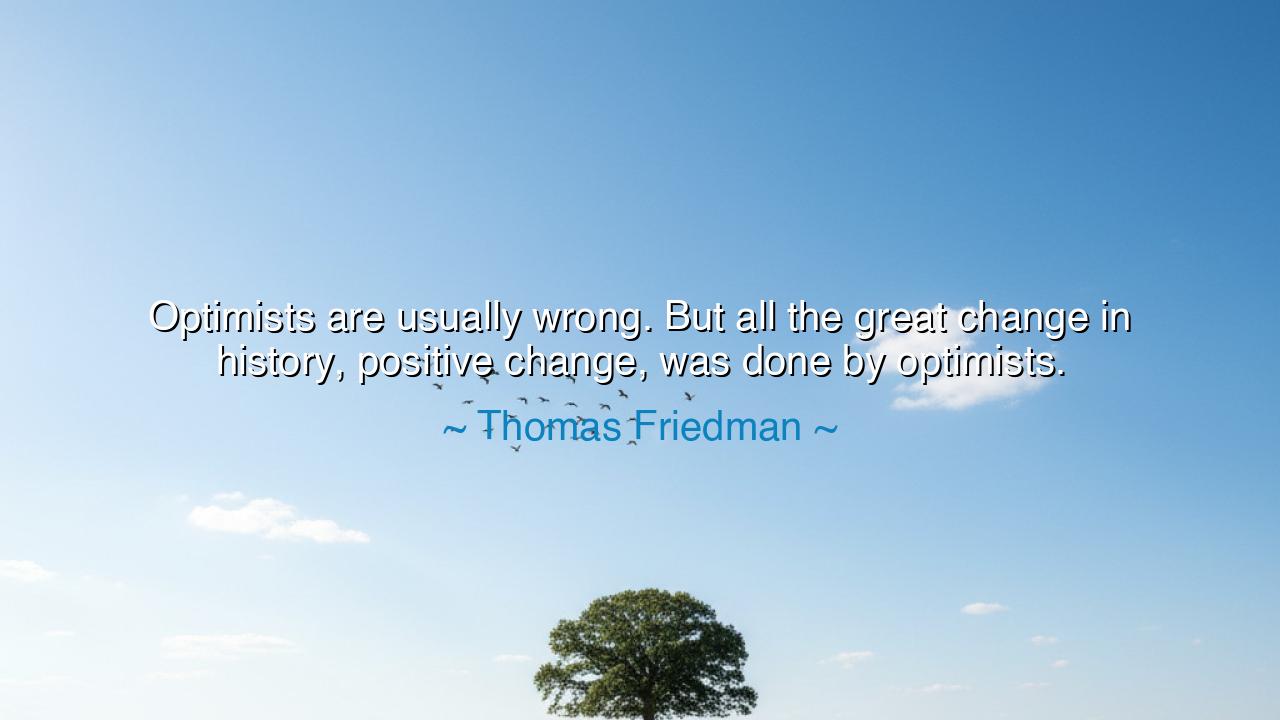
Optimists are usually wrong. But all the great change in history
Optimists are usually wrong. But all the great change in history, positive change, was done by optimists.






In a world often burdened by doubt and cynicism, the voice of the modern sage Thomas Friedman rings with paradoxical truth: “Optimists are usually wrong. But all the great change in history, positive change, was done by optimists.” In this saying lies a wisdom as sharp as it is hopeful — that even though those who dream may often misjudge the odds, it is their very belief in possibility, their refusal to yield to despair, that has moved humanity forward through the ages. The optimist does not succeed because he is always right, but because he dares to act as though the impossible can be made real.
To say that optimists are usually wrong is not to condemn their vision, but to honor their courage. The pessimist, armed with realism, may see the world as it is — broken, uncertain, cruel — and therefore do nothing. But the optimist, though he may stumble, believes that the world can be better, and in striving for that belief, he transforms it. Error, in this sense, becomes the price of progress. Every great invention, every movement of liberation, every work of genius was born not from certainty, but from faith — faith that one’s efforts could pierce through impossibility and give birth to the new. Friedman reminds us that change begins not in the mind that calculates, but in the heart that hopes.
The origin of this quote rests in Friedman’s reflections on human progress, technology, and the power of belief amid crisis. As a chronicler of globalization and innovation, he observed how the great builders of our age — the engineers, the reformers, the scientists — were rarely sure their work would succeed. Yet they acted anyway, carried by conviction. In his words we hear the echo of history itself, for every century has proven this truth anew: that the world is shaped by those who are foolish enough to dream of its improvement.
Consider the story of Thomas Edison, the tireless inventor who failed more than a thousand times before creating the electric light. Each attempt ended in darkness, yet each failure taught him something vital. A pessimist would have abandoned the quest long before the final spark; an optimist kept faith with the unseen light. Edison’s optimism was, as Friedman said, “usually wrong” — but it was that very persistence, that stubborn faith against reason, that finally transformed the night of humanity into the dawn of modern civilization. The world moves forward not through the accuracy of the few, but through the hope of the many.
Likewise, the great abolitionists of the nineteenth century, men and women who fought to end slavery, stood against centuries of cruelty and entrenched power. Their cause, to many, seemed naïve, impossible — the dream of idealists out of touch with reality. Yet their optimism, their unyielding belief that human dignity could triumph, became the moral force that reshaped nations. From their “wrongness” was born a new rightness — a world that could breathe more freely. So too did the civil rights movements, the suffragists, and the reformers of every age bear the same pattern: mocked for their idealism, vindicated by time.
The optimist, then, is not a fool, but a warrior of the unseen. He walks in uncertainty, guided not by evidence, but by vision. He accepts that he may err, yet chooses to act anyway, because inaction itself is a greater sin than failure. For history is not written by those who predicted decline, but by those who imagined ascent. The pessimist may protect himself from disappointment, but he achieves little beyond self-preservation. The optimist risks heartbreak, yet builds the world anew.
And so, O seeker of wisdom, let this truth sink deep into your heart: it is not accuracy but faith in possibility that changes the course of time. You will be wrong many times if you choose the path of optimism. You will fail, stumble, and be mocked for your belief. Yet if you persist — if you continue to act as though good can triumph and light can overcome the dark — you will join the lineage of those who built empires of hope from the ruins of despair. Be not afraid of being wrong; be afraid of not trying at all.
Thus, let us remember the teaching of Thomas Friedman: that optimism is the fuel of progress, even when its predictions falter. Do not wait for certainty before you act. Dream, and then labor for that dream. Believe, and then build. For though the optimist may often err, it is through his errors of faith that the world ascends toward its better self — one step, one hope, one daring act at a time.






AAdministratorAdministrator
Welcome, honored guests. Please leave a comment, we will respond soon